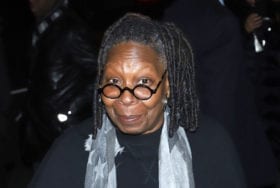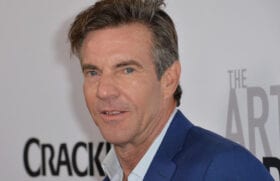A CYNOPSIS MESSAGE FROM CBS RADIO & CBS LOCAL DIGITAL MEDIA
play.it
YOUR NEW PODCAST NETWORK
Discover original podcast shows plus CBS RADIO’s family of on-air programming.
FOR THE 1st TIME ADVERTISERS CAN TARGET BRAND MESSAGES TO ENGAGED PODCAST USERS AT SCALE Now is the time to ADVERTISE on play.itFor more information and pricing email [email protected].
Cynopsis Media Presents: CES Wrap-up
CES Wrap-Up
By Chris Pursell
As International CES attendees mulled the latest in 4K televisions, drones and 3D printing last week, it was the ascension of another commodity that is defining the future of the annual event… the CMO.
The annual technology showcase now finds itself framed as a statistical wonderland of data as the newest models of televisions, cars, apparel and even appliances hit the forefront of the convention floor. The next-gen electronics are learning the habits of the user and offering a personalized opportunity for brands to find links to the consumer using fresh methods never before possible.
Indeed, CES officials set up the first-ever C Space venue at the Aria hotel this year, marked as "the official CES destination for creative communicators, brand marketers, advertising agencies, digital publishers and social networks." Participants included the likes of Google, GroupM, Mindshare, Hulu, NBCUniversal, Twitter and Yahoo. In fact, according to the Consumer Electronics Association, which produces CES, the event has attracted more than 30,000 attendees from the advertising, content, and entertainment communities in recent years and numbers grow with every new calendar. As such, business is percolating with previously unimagined opportunities.
With demand for information at a premium, executives saw that marketers are being handed the tools to reach consumers at the right moment, with a personalized message released at exactly the right time, thanks to big data. Those prospects are leaving marketers agog.
“Data and computer science has evolved so much,” Mastercard CMO Raja Rajamannar told attendees at CES, noting that the brand also generates its own volumes of data every time consumers swipe their card. “It’s like being a kid in a candy store, because there’s so much that can be done we’ve never been able to do before.”
TiVo was one company to step forward with its yearly batch of number crunching, announcing results of the second annual tablet and smartphone streaming analysis report. The study showed that a whopping 85% of programming streamed originated from viewer’s DVR recordings. In addition, Sundays served as the most popular day of the week to stream video to a mobile device, dramatic programming as the most watched genre and The Walking Dead as the primetime show most streamed to second screen devices.
“On the TV front, we’re at an inflection point around OTT access now being ubiquitous across devices, and I think Sling TV [which won Engadget’s Best of the Best Award] got so much attention mostly because it includes the typically-sacred ESPN in their package–again, an incremental addition to a general concept [OTT across lots of platforms] that has now been with us for a while,” said TiVo Chief Research Officer Jonathan Steuer.
Indeed, DISH Network’s introduction of Sling TV marked the latest, biggest step in the OTT movement, delivering the likes of ESPN, TNT, TBS, Disney Channel and Cartoon Network online for a bargain-basement price of $20/month.
“Consumers can now watch their favorite shows on their favorite devices that they already use to watch video. Live television, including ESPN, for $20 per month with no commitment or contract, is a game changer,” said Roger Lynch, CEO of Sling TV. “The product lets consumers who’ve embraced services like Netflix and Hulu take more control of their video entertainment experience.”
Those consumers, of course, are likely to be millennials, who are inhaling their content in a dramatically different fashion. In fact, a study from NATPE and the CEA on consumer attitudes toward television viewing reveals that only 55% of millennials use TVs as their primary viewing platform, with streaming devices set to take over viewing habits. The study, conducted by E-Poll Market Research, found that the millennial demographic group – age 13 to 34 – is significantly more likely to consume full-length TV programs from a streaming source (84% streamed in the past six months) than live TV programming at its original air time (54%).
The study also found that millennials value their ability to stream content above cable or broadcast channels as 51% considered their subscription to Netflix “very valuable,” compared to 42% for broadcast channels, and 36 percent for cable subscriptions.
“Our study confirms that the paradigm for TV content discovery has changed dramatically with increased availability and use of TV content streaming options,” said NATPE President & CEO Rod Perth. “With more than seven in 10 viewers in broadband households having streamed full-length TV programs in the past six months, there are opportunities for networks and content producers to reach and build audiences.”
The mandate for on-demand content isn’t only video-based either. CBS Radio and CBS Local Digital Media announced the launch of Play.it at CES, a new podcast network that offers more than 300 premium content podcasts at launch from CBS Radio personalities as well as series from news, lifestyle, sports and media brands including 48 Hours, 60 Minutes, CBS Sports Radio, Vox, Deadspin, Simon & Schuster and Foursquare, among others.
“We’ve learned from our audience that for content that isn’t perishable, there is a longer shelf life for on-demand content such as pop culture, comedy and business,” said Ezra Kucharz, President of CBS Local Digital Media. “For the last 10 months, we’ve been working on Play.it as an initiative to create this on-demand audio platform. We were trying to figure out where to launch it where we would have the digital community and digital industry in one place as well as the marketers and there was no better place for that than CES.”
This paradigm shift is causing executives to reconsider their overall experience. One company at the show, OneTwoSee, had a lineup of visitors wanting to take a second look at their programming plans.
“We’re seeing marketers look for ways to converge the second screen experience into the primary screen or the primary viewing experience,” said company CEO Chris Reynolds. “Folks have the ability to access all this content through one screen and we like to correlate that into a more robust augmented experience. When you make these experiences available, you’re going to generate a significant amount of return usage.”
For marketers, this means more opportunities to get highly-personalized messages front-and-center for audiences at scale. The Brand Matters panel saw executives from Google, McDonald’s, Disney, Conde Nast and Fox urge their peers to take a more sophisticated approach to using technology to balance their media budgets with reach by creating personal experiences in their content and treat mobile connections as a behavior rather than a device.
"You need to find the distribution [outlet] for amazing content but the ability, especially with the advent of mobile, to begin to understand the consumer context is what people expect,” said Margo Georgiadis, President of Americas at Google, who notes that “technology enables personalization; it should be like a toothbrush, something a lot of people use at least twice a day.”
"With all of that data now available we see an opportunity to transform into a more human, frictionless, convenient and fun experience,” added McDonald’s CMO Debbie Wahl on the importance of addressing needs rather than marketing. “It’s about understanding how you get people to immediately engage with something that’s so relevant and useful that it also brings value to them."
Meanwhile, executives from Facebook, Google and Pinterest were quick to spotlight the uniqueness of the data coming through their own platforms at a panel on Wednesday.
“From an entertainment marketer standpoint, we have a tremendous amount of data on what’s taking off and what’s driving engagement,” said Jim Underwood, head of entertainment strategy at Facebook. “We’re at a place now where there’s such a volume of content that the audience is looking for solutions to – and we can help them find the content that matters to them.”
Of course, while data presents a new door to explore for marketers, it isn’t the Holy Grail, as CBS Corp. President and CEO Leslie Moonves reminded audiences during his on-stage interview.
"Data is spectacular," said Moonves. "Having said that, research only becomes part of your decision-making… There still has to be the human element that says, ‘This is damn good.’"
Later — Chris
Chris Pursell for Cynopsis | Sports @VegasandVine
01.12.15
Copyright Cynopsis 2015
All outgoing e-mails are scanned and sent out virus free. Copyright Cynopsis 2015





